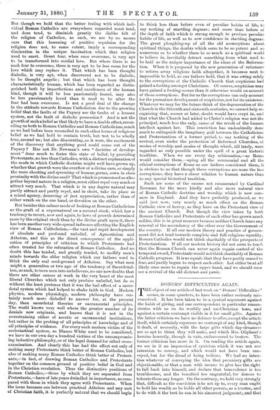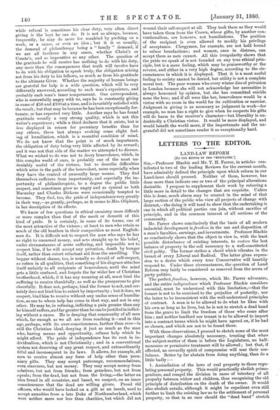DONORS' DIFFICULTIES AGAIN.
THE object of our article of last week on" Donors' Difficulties" seems, in some quarters, to have been rather seriously mis- conceived, it has been taken to be a cynical argument against the habit of giving, and one correspondent in particular remon- strates with us on its worldly and un-Christian tone, and against a certain, contempt visible in it for small gifts. Against the latter criticism we have no defence to offer, except the article itself, which certainly expresses no contempt of any kind, though it dealt, of necessity, with the large gifts which day-dreamers are so apt to think they will make, and which Mrs. Oliphant's heroine honestly, though in vain, endeavoured to bestow. The former criticism has more in it. On reading the article again, we see in it an impression of cynicism which it was not our intention to convey, and which would not have been con- veyed, but for the dread of being tedious. We had no inten- tion whatever of conveying the idea that pecuniary gifts are objectionable, or that a man with means to give has the right to fall back into himself, and declare that benevolence is too troublesome, and the benefited too ungrateful, for donors to tolerate them any longer. On the contrary, we hold very strongly that, difficult as the conviction is to act up to, every man ought to hold his wealth as he holds all other powers, as a trustee, and to do with it the best he can in his sincerest judgment; and that
while refusal is sometimes his clear duty, very often direct giving is the best he can do. It is not so always, because, frequently, he niay do more for mankind by pushing on a work, or a cause, or even an idea ; but it is so usually, the demand of philanthropy being a " family " demand, if we are all brethren in any sense, whether Christ's or Comte's, and as imperative as any other. The question of the gratitude he will receive has nothing to do with his duty, any more than the consequences that truth will involve have to do with his obligation to speak truly, the obligation arising not from his duty to his fellows, so much as from his gratitude to the ultimate Giver. Whether the majority of human beings are grateful for help is a wide question, which will be very differently answered, according to each man's experience, and probably each man's inner temperament. One correspondent, who is sorrowfully angry with us, says he is constantly giving in sums of £50 and £100 at a time, and is invariably satisfied with the result; but that may be because he has been exceptionally for- tunate, or has expected very little. Another says he has found gratitude usually a very strong quality, which is not this writer's experience ; while a third declares that it exists, but is less displayed in return for pecuniary benefits than for any others, these last always evoking some slight feel- ing of humiliation, which is a resentful condition of mind. We do not know that the point is of much importance, the obligation of duty being very little affected by its reward; and it was not that side of the matter we attempted to discuss. What we wished to do was not to decry benevolence, which, in this complex world of ours, is probably one of the most un- deniably useful of the virtues, but to describe difficulties which arise in the path of the benevolent, more especially when they have the control of unusually large means. They find themselves sufferers from importunity, and especially the im- portunity of philanthropists, to a degree the public little suspect, and sometimes grow as angry and as cynical as both Macaulay and Charles Dickens were occasionally tempted to become. They find, too, the pride of independence very greatly in their way,—as greatly, perhaps, as it seems to Mrs. Oliphant, in her description of its effects.
We know of few questions in ethical casuistry more difficult or more complex than that of the merit or demerit of this kind of pride. It is certainly, in some of its forms, one of the most attractive of the virtues ; at least to men who retain as much of the old heathen in their composition as most English- men do. It is difficult not to respect the man who says he has no right to unearned money, and acts straight up to his belief, under circumstances of acute suffering, and impossible not to respect him, if he will accept any privation, death by hunger itself, rather than extort reluctant aid from the unwilling. The beggar without shame, too, is usually so devoid of self-respect, so rotten in all qualities, that something of his disgrace attaches itself unfairly to all recipients of benevolence, until the mind gets a little confused, and forgets the far wider law of Christian brotherhood, which, if it has any meaning at all, must bind the suffering to receive thankfully, as well as the prosperous to give cheerfully. It does not, perhaps, bind the former to ask, and cer- tainly does not bind him to extort by importunity ; but it does, we suspect, bind, him to receive without any undue sense of humilia- tion, as one to whom help has come in that way, and not in any other. He may be, in refusing, inflicting a pain greater than any he himself suffers, and far greater than he can be justified in inflict- ing without a cause. He is denying that community of all men which, far enough as we all are from reaching it—and in this age, perhaps, with its over-consciousness, farther than ever—is still the Christian ideal, denying it just as much as the man who, having means and opportunity, refuses help which he might afford. The pride of independence has its root in in- dividualism, which is not Christianity ; and in a conventional system not deserving of any great respect, and extraordinarily fitful and inconsequent in its laws. It allows, for example, all men to receive almost any form of help other than teen- niary gifts. They may accept patronage, recommendations, even sinecures, but not money. They may accept money from relatives, but not from friends; from grandees, but not from equals; from the dead, but not from the living,—the latter an idea found in all countries, and based, we suspect, on an inner consciousness that the dead are willing givers. Proud old officers, who would have looked on a gift as an insult, used to accept annuities from a late Duke of Northumberland, which were neither more nor less than charities, but which did not wound their self-respect at all. They took them as they would have taken them from the Crown, whose gifts, by another con- ventionalism, are honours, not humiliations. The position of the recipient is even allowed to modify his privilege of acceptance. Clergymen, for example, are not held bound to refuse benefactions; and women, once in distress, can accept them as men cannot. All this irregularity shows that the pride we speak of is not founded on any true ethical prin- ciple, but is a mere feeling, which may be praiseworthy or the reverse, and either in a very high degree, according to the cir- cumstances in which it is displayed. That it is a most useful feeling to society cannot be denied, but utility is not a complete moral test. The poor woman who every winter dies of privation in London because she will not acknowledge her necessities is always honoured by opinion, but she has committed suicide none the less; and if all were like her, benevolence would be a virtue with no room in the world for its cultivation or exercise. Judgment in giving is as necessary as judgment in work—for example, no man has a right to give when he suspects his gifts will do harm to the receiver's character—but liberality is un- doubtedly a Christian virtue. It would be more displayed, and would benefit the world more, if the importunate and the un- grateful did not sometimes render it so exceptionally hard.



































 Previous page
Previous page